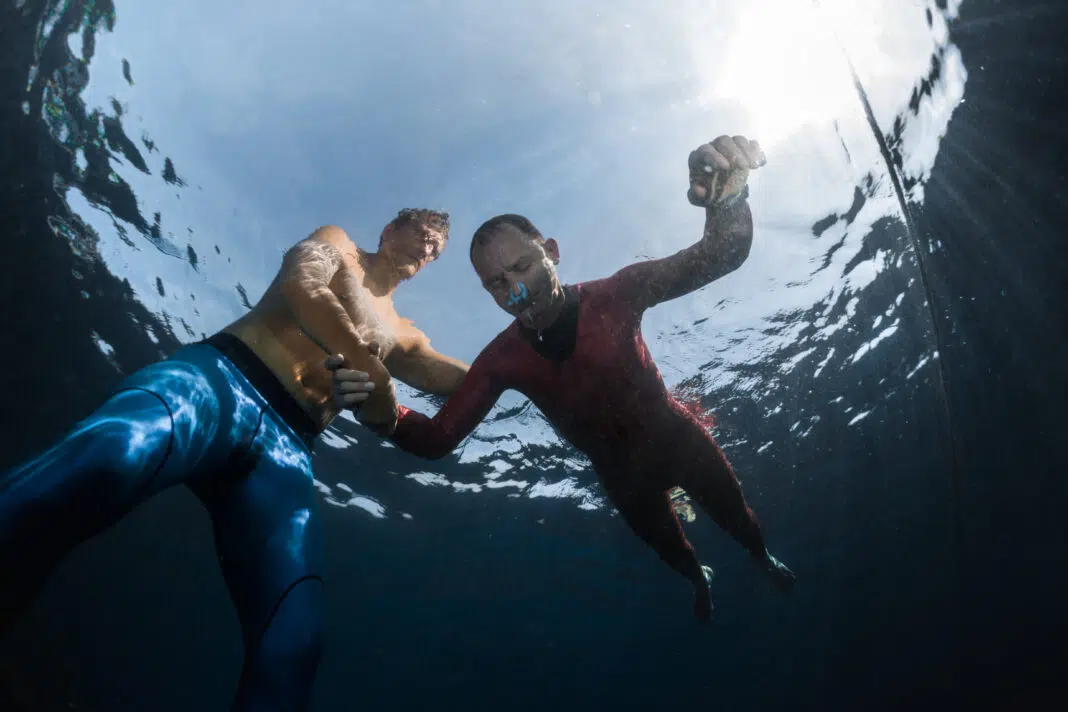The Instagram feed of a freediving instructor tells a compelling story: Divers dive through rays of light in all different shades of blue, show off big numbers on little dive computers, and overjoyed faces get splashed in celebration of successful dives.
As an AIDA and Molchanovs freediving instructor for eight years, I’ve had my fair share of students tell me that they wanted to leave their office jobs to pursue a career as instructors. When I ask them why, they usually mention that they love freediving and want to work in their passion or that they want to live the “island life” they see on social media.
I love hearing their reasoning; in fact, I think I remember these words being some of my own–once upon a time. But while Instagram can paint a glamorous portrait of days spent chasing personal bests with joyful students and diving after incredible sea creatures, does that tell the whole story?
Keep reading to discover the thrilling highlights and the challenging realities of being a freediving instructor.
Escaping office culture
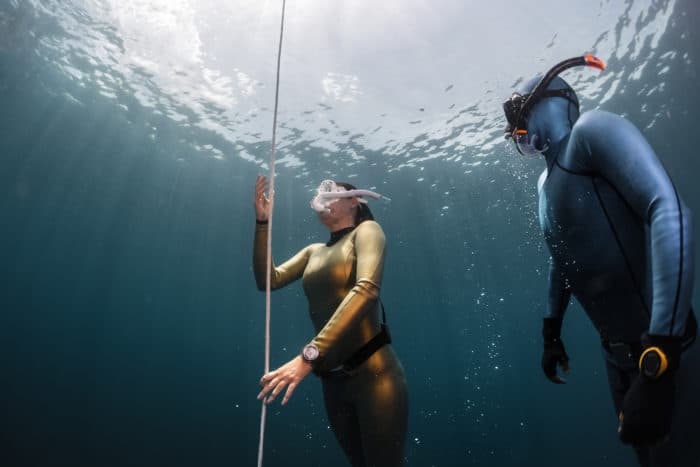
I’ll be honest: One of the best parts of being a freediving instructor is breaking free of padded cubicle walls, never enduring another boring conference call, and living outside a routine 9-to-5 schedule. After all, you’ve traded up artificial lighting for real-life sunshine and recycled air for fresh sea breezes!
…for less money
But you’re also giving up the good parts of the office–a steady paycheck (for a MUCH smaller and unstable one), health insurance, a pension, and paid time off. If being an instructor is a side income for you, then great–but if not? Hopefully, you’ve carefully weighed your options, especially if you’re getting older and considering retirement savings or unexpected medical expenses for your creaky body.
Plus, if you work for yourself rather than a school, you’ll find a ton of “unpaid” work, such as marketing, communicating beforehand with students, maintaining equipment, etc.
In short, people don’t become freediving instructors for the money; they do it for the lifestyle.
Living in exotic places
Suppose you’re set on becoming a full-time freediving instructor and want to make a living off of it. In that case, you’ll have to make a move–I’m talking about the Philippines, Indonesia, Egypt, Belize, and other fabulously sunny and warm international vacation spots with thriving marine life.
Not bad, right?
…and sometimes challenging adjustments
You’re limited to which spots, though. These places are often touristy, which naturally comes with tourist pricing. Since your income probably won’t support tourist pricing, you’ll have to be savvy when looking for an apartment or house, restaurants, places to socialize, and transportation. Plus, don’t forget that things like healthcare and the criminal justice system can be wildly different from what you’re used to, which can come as a big (and sometimes very unpleasant) surprise.
While you have some incredible locations to choose from for work (depending on your passport and work permit situation), you’ll inevitably have to adjust your expectations.
Making your passion your profession
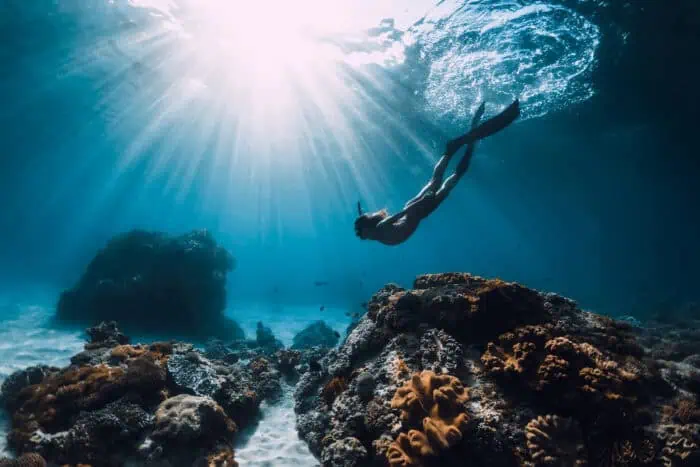
Isn’t it everyone’s dream as a young adult to find a job that they are passionate about–one that doesn’t even feel like work? The joy people feel while freediving can inevitably lead them to wonder why they don’t do it full-time, making money from doing something they love.
…but possibly losing some of that passion
Yet there is a reason why this saying exists: “Don’t turn your passion into your profession, or you might end up losing both.” Freediving for fun and training for yourself is entirely different than teaching students freediving. Your focus should be entirely on them during a session, and let me tell you that freediving when you’re tired or not feeling like it won’t exactly make you love freediving more.
If you’re also trying to advance your freediving skills, it’s often difficult to find time to train for yourself if you have a lot of students (unless you’re really disciplined). In the busy season, dry days can be few and far between.
Some people can stay passionate about freediving while working in it, while others may feel their fascination dwindle–so just be prepared for any possibility.
Living a healthy lifestyle
Freediving instructors are usually in decent physical shape and are healthy individuals. Why? Freediving is very physical and requires stamina–handling buoys, rope, and bottom weights; swimming to dive sites; diving with each student; etc. Freediving also naturally encourages a healthier lifestyle!
…but your health affects your work
Unfortunately, life happens; everyone gets sick or injured sometimes. As a freediving instructor, getting sick with something like a cold can exhaust you (and get your students sick) and affect your ability to equalize. The same goes for a physical injury: you can risk worsening your condition by continuing to dive.
As a freediving instructor, you’ll sometimes need to choose between losing out on money to recover or diving through the pain if you’re sick or injured–there’s no paid time off in this business.
The ocean (or pool) is your office
Everyone’s seen those photos of the beach on social media with the caption, “My office for today.” Well, as a freediving instructor, you’re one of those people! A sunny day with mild winds and a calm surface can be your workday, filled with the vitamin D and fresh air you’d lack in a real-life office!
…even on the rough days
But the ocean and weather are fickle, and stormy days with choppy waves, chilly waters, and endless currents are also your “office” days, making your job that much harder. The difference between working in a regular office and the outdoors is that the weather directly affects you. There’s no hiding in a climate-controlled room watching stormy weather from the window.
Working in all types of weather can be tough to get used to if you’ve never worked in the outdoors before.
Watching your students flourish
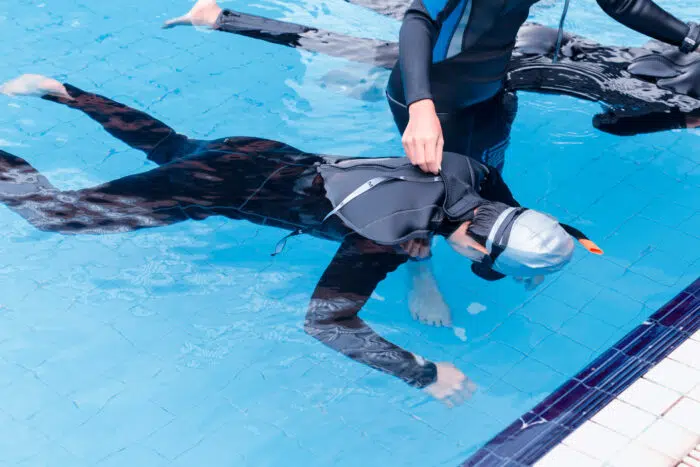
One of the best parts of freediving instruction is being such an intimate part of your student’s journey. You get a front-row seat to their nervousness and fear and then later watch their triumphant faces as they gain confidence and break through personal barriers!
…which comes with a lot of responsibility
But what lies between your student’s fear and triumph is a tremendous responsibility on your part: their safety. Your job is to ensure they inch along the path of progress without significant setbacks, constantly toeing the line. Not to mention navigating surprise currents, boat traffic, difficult entries/exits into the water, seasick-inducing waves, and more.
Keeping yourself and your students safe while freediving isn’t just important–it’s everything.
Meeting tons of new people
Most people who want to try freediving have an adventurous streak or at least a passion for water–something that ties us all together. As an instructor, depending on where you work, you’ll meet many interesting people from different parts of the world. Socializing with them is part of the job!
…even when your social battery is drained
But even extroverts need some rest, and if you’re teaching many courses, you might not get enough between diving and teaching and socializing to doomscroll in bed. There’s also a difference between socializing with friends and students; friends you can complain to and be fully yourself with, while you still need to keep a professional air with students.
Remember, your students paid hard-earned money for a course, so you should make it a fun and positive experience–no matter how you feel on a given day.
Should you become a freediving instructor?
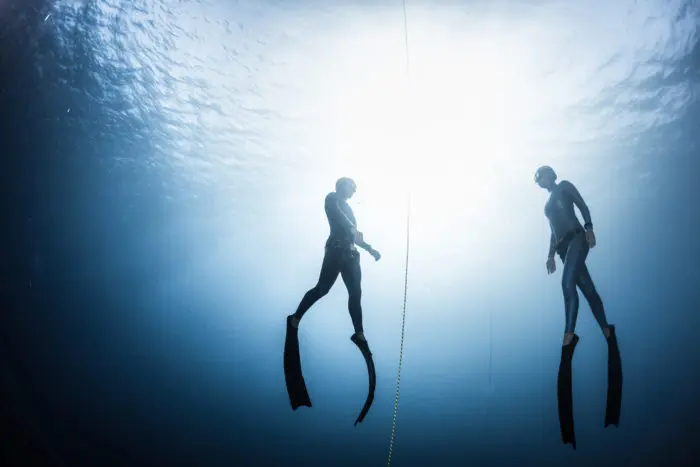
Being a freediving instructor has its perks: the freedom of leaving a desk job behind, being healthy and physically fit, helping students discover newfound abilities, and getting to do the thing you love so passionately for money. But, like any job, there are two sides to every coin–tough days at sea, some inevitable lifestyle changes to be made, and a salary cut for most people.
But if you have a unique connection to the water and are ready to embrace a simpler lifestyle, then becoming a freediving instructor could be your perfect next chapter!

